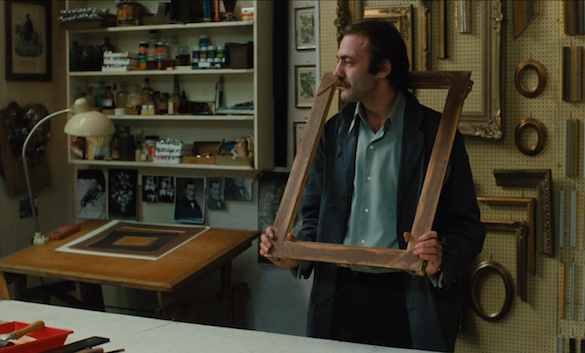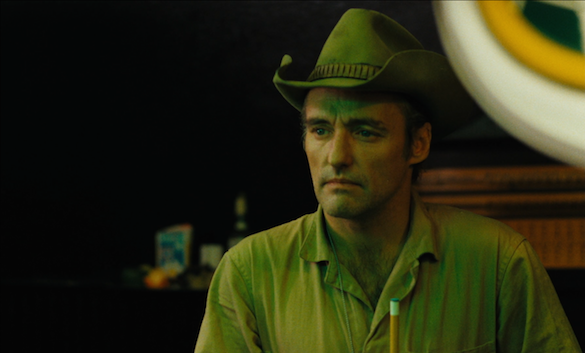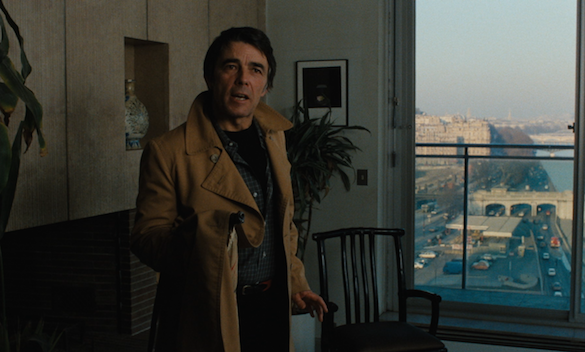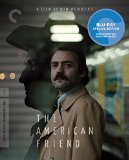| Reviews & Columns |
|
Reviews DVD TV on DVD Blu-ray 4K UHD International DVDs In Theaters Reviews by Studio Video Games Features Collector Series DVDs Easter Egg Database Interviews DVD Talk Radio Feature Articles Columns Anime Talk DVD Savant Horror DVDs The M.O.D. Squad Art House HD Talk Silent DVD
|
DVD Talk Forum |
|
|
| Resources |
|
DVD Price Search Customer Service #'s RCE Info Links |
|
Columns
|
|
|
American Friend: Criterion Collection, The
The Movie:

A minor insult at an art auction is enough to plunge Jonathan Zimmermann into a world of intrigue and murder in Wim Wenders's 1977 film The American Friend, adapted from the novel Ripley's Game by Patricia Highsmith. The marriage of director and source material is an initially puzzling one, because Wenders is best-known for rambling, melancholy dramas like Paris, Texas, while Highsmith is known for crafting tightly plotted psychological thrillers. Setting aside the initial incongruity, the combination works like gangbusters, even if fans of Highsmith's books might bristle at Wenders's far-from-literal take on the author's world. (Those folks might be better satisfied by The Talented Mr. Ripley or the 2004 version of Ripley's Game.)
Bruno Ganz (Wings of Desire, Downfall) stars as Jonathan, a modest art framer who has a terminal blood disease. When Jonathan sees eccentric American con man Tom Ripley (Dennis Hopper) selling a work of art of questionable authenticity, he gives Ripley the cold shoulder and ends up paying for it. (Of course, the painting was fishy; the artist, Derwatt [played by Hopper's Rebel Without a Cause director, Nicholas Ray], is supposed to be dead, but he's not. Ripley has the supposedly late painter create new work that can be sold at top dollar.)
A French gangster named Minot (Gérard Blain) comes to Ripley to hire him for a murder, but Ripley doesn't like the smell of it. He feeds Jonathan to Minot, telling the gangster to use Jonathan's disease as leverage. Minot takes the tip and then goes to enormous lengths to convince the skeptical frame maker that his illness is going to kill him sooner than he expected. He offers to pay Jonathan a generous sum, which will support his family for years to come. A blind-sided Jonathan eventually finds himself in the Paris metro station, with a gun in his hand, waiting to assassinate an American gangster.
Wenders proves himself to be an excellent thriller director. His patience with the characters and the way he slowly builds the film's quiet, dark mood perfectly primes the unsuspecting audience for the suspenseful sequences to come. When we finally see Jonathan in that train station, wrestling with his conscience while he must figure out the logistics of how to commit murder, it's a true nail-biter. A later sequence on a moving train, where Ripley intervenes after learning that Jonathan is being set up to confront some other gangsters, simultaneously feels perfectly constructed filmmaking-wise while playing out as frantic and chaotic within the story of the film.
The relationship between Jonathan and Ripley also sets this film apart as a superior neo-noir. Especially as played by Ganz and Hopper, these two men are lonely kindred spirits, isolated by their circumstances. Even as Ripley is setting Jonathan up, he feels a fondness for this funny man who works alone with his hands and keeps a collection of antique visual toys (zoetropes, etc.). Jonathan is unsurprisingly a little more cautious toward the unbalanced Ripley, but he finds himself drawn to this cowboy-hat-wearing weirdo for many of the same reasons that he is initially repelled. Certainly by the end of the film, their strange friendship resonates more powerfully than any turns of the plot, making the title change for the film completely logical. This is not a film about a "game." The focus has been taken off of Ripley's Machiavellian tendencies and it now rests, most effectively, on the unexpected connection between these two misfit characters.

The Blu-ray
The disc comes packaged with one of Criterion's new standard fold-outs containing an essay by novelist Francine Prose.
The Video:
This AVC-encoded 1080p 1.66:1 transfer is an excellent rendering of Robby Müller's alternately drab and striking cinematography. Müller uses a lot of fluorescent lighting, and this version "corrects" it a bit, looking more nuanced and less consistently green than the old Anchor Bay DVD, but it doesn't wreck the overall effect Müller and Wenders seem to have been going for. Excellent fine detail and consistent film grain structure, with very little noticeable dirt or damage.
The Audio:
The German and English DTS-HD MA 5.1 surround mix (with both optional English subtitles for just the German dialogue and English SDH for everything) is clear and satisfying. The ambience is fairly subtle in the surrounds for the majority of the film, but the mix nicely serves Jürgen Knieper's music cues and certainly ratchets up the tension during the train sequence.
Special Features:
- Carried over from the old Anchor Bay DVD, this 2002 commentary is low-key, but with interesting anecdotes about things as varied as Patricia Highsmith's changing reaction to the film over time, Hopper's experience on Rebel Without a Cause, and Samuel Fuller's encouragement to Wenders to make his third feature film, Alice in the Cities. In other words, it's often not about what's happening onscreen -- but it's extremely entertaining.
Final Thoughts:
Memorable performances from Bruno Ganz and Dennis Hopper highlight this excellent literary adaptation by director Wim Wenders. Criterion didn't disappoint in the A/V department, or in augmenting the old DVD bonus features. Highly Recommended.

Justin Remer is a frequent wearer of beards. His new album of experimental ambient music, Joyce, is available on Bandcamp, Spotify, Apple, and wherever else fine music is enjoyed. He directed a folk-rock documentary called Making Lovers & Dollars, which is now streaming. He also can found be found online reading short stories and rambling about pop music.
|
| Popular Reviews |
| Sponsored Links |
|
|
| Sponsored Links |
|
|
| Release List | Reviews | Shop | Newsletter | Forum | DVD Giveaways | Blu-Ray | Advertise |
|
Copyright 2024 DVDTalk.com All Rights Reserved. Legal Info, Privacy Policy, Terms of Use,
Manage Preferences,
Your Privacy Choices | |||||||













